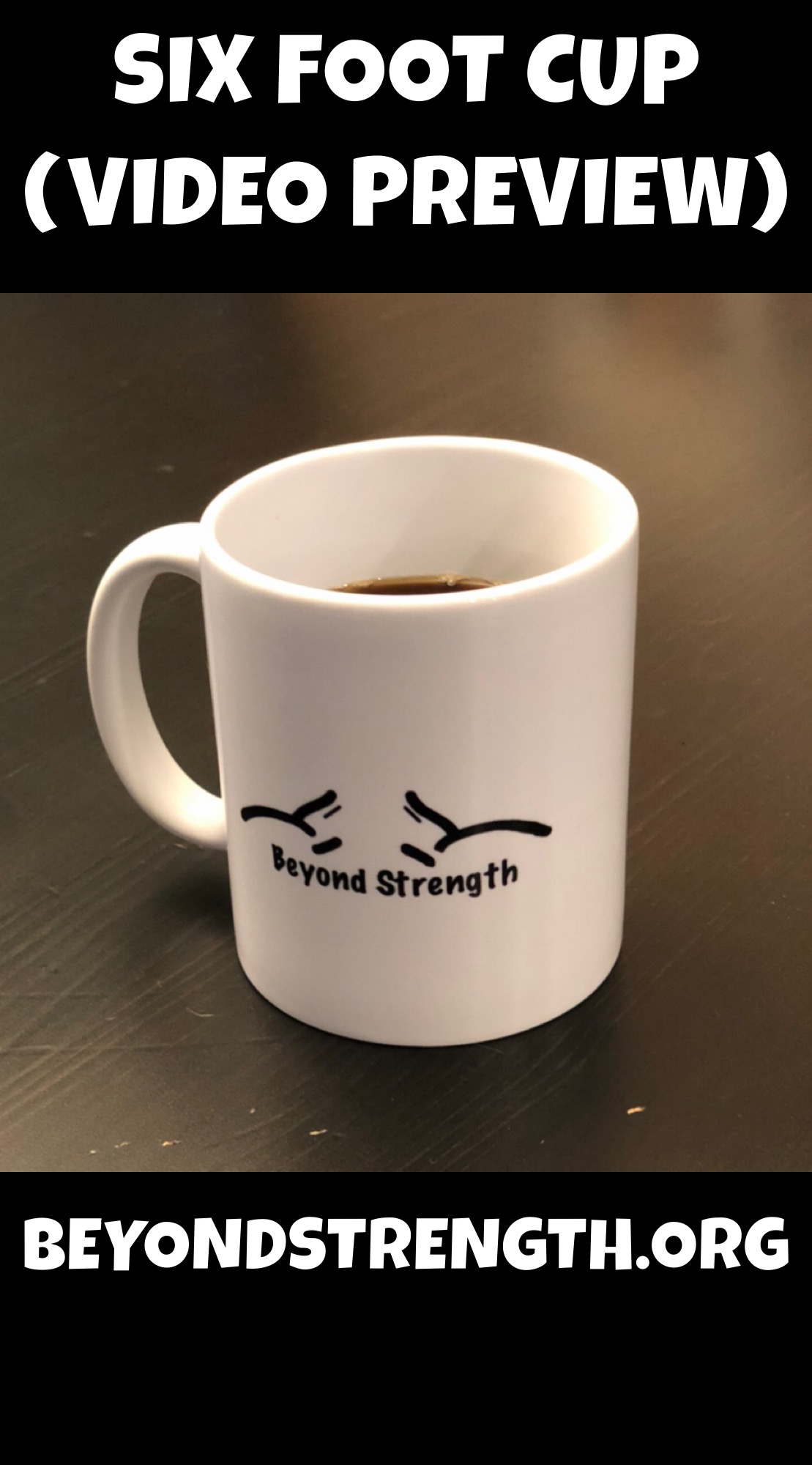


Walls & Window Dressings
My parents divorced when I was young. Hindsight tells me that resulted in a fair amount of confusion and uncertainty, even though I didn’t recognize it at the time. It likely explains, on some deeper psychological level, some of the nonsensical things that provide a sense of comfort even to this day. Things like carports, covered porches, other overhangs and enclosures; airports, hospitals, other places that are always open; and structure or routines.
One of those routines was watching the yearly broadcast of classics like ‘It’s the Great Pumpkin, Charlie Brown’, ‘A Charlie Brown Christmas’, ‘Rudolph the Red-Nosed Reindeer’, ‘Frosty the Snowman’, and ‘The Wizard of Oz’. Pre-cable, pre-streaming (even pre-color in some instances), these were standard family routines. Later, annual VHS viewings of ‘White Christmas’ became a new but similar routine. Likely because I could relate, I remember feeling bad for Charlie Brown, and angry at those making fun of Rudolph. I also remember being a little freaked out by flying monkeys, melting witches, and talking melting snowmen. Owning a quaint lodge somewhere like Vermont, or performing in dinner clubs across the world like entertainers Crosby, Kaye, Arnaz, or Sinatra has secretly always appealed to me.

Then there’s that pay-no-attention-to-the-man-behind-the-curtain thing.
I routinely self-deprecate. The fact it took me a minute to fully understand the Wizard’s deception doesn’t make me feel better about myself. Nonetheless, all the above provide analogue to things like transparency, accessibility, reality, and routines.
Roman emperor and philosopher Marcus Aurelius wrote “Never value anything as profitable to yourself which shall compel you to break your promise, to lose your self-respect, to hate any man, to suspect, to curse, to behave hypocritically, to desire anything which needs walls and curtains.” (emphasis added)
I was pretty much toast at point number one…with a firm twisting of the knife by the last.
The Apostle Paul put it another way: “”Everything is permissible” – but not everything is beneficial. “Everything is permissible” – but not everything is constructive.” (1 Cor. 10.23)
Consider the words of former FBI profiler Roy Hazelwood that perhaps cut deepest to the heart of the matter: When everything is tolerated, nothing is forbidden. Does that not typify today’s social condition? Moral relativism. Woe any who disagree or take a contrary stand based on their own values or viewpoints.
I’m certainly not qualified to cast stones. But it seems duplicitous to accuse people of intolerance or narrow-mindedness simply because they disagree or don’t embrace one thing or another, pointing the finger of judgment and demanding concurrence with their worldview – yet not giving others the same allowance to believe as they choose. We don’t have to agree on everything to respect one another…not embracing someone else’s beliefs, lifestyle, or opinion doesn’t automatically render the other person a bigot.
Like the Wizard, duplicity and transparency are just a couple of problems with many people and organizations. Its effects are compounded particularly within organizations, where people have been repeatedly ‘rewarded’ despite lackluster performance, or promoted beyond their level of competency, and are unable or unwilling to change. Instead, pride or a lack of humility keeps them in a land of Oz, protected by their walls (position) or concealed behind their curtain of favoritism and double-standards; blind or unconcerned to the impact of their actions. This obfuscated leadership tendency is likely one attribution to the phrase ‘smoke and mirrors’.
Two years ago I wrote ‘Friends without Coffee’, a tribute to my South Florida friend. I described him as an unfiltered, anti-establishment kind of guy. He isn’t one to beat around the bush. He says what’s on his mind…no smoke and mirrors. While some cringe at that, he is the antithesis of the assertion “If you have politically correct opinions, you can get away with just about anything.”1

In a creative retelling of a Greek warrior-god in her book The Song of Achilles, author Madeline Miller masterfully describes this ‘direct’ disposition she gave Achilles: “He said what he meant. He was puzzled if you did not. Some people might have mistaken this for simplicity. But is it not a sort of genius to cut always to the heart?”
It’s hard not to respect someone for being unapologetically real. Organizations and people, alike, could benefit from more reality.
And less window dressing.
Everyone is flawed. But refusing to acknowledge, change, or improve known shortcomings is willfully negligent. Taking the yellow brick road of prudence and humility is a good start. Maybe an apology or two. Probably best if I shuffled around the house on my knees to save time preparing for my next apology…
Sometimes we erect walls to protect ourselves because of past wrongs or heartache. We also hide parts of ourselves, our thoughts, or our actions to spare those we care about from the pain it would cause them. We even blur the truth for other reasons, right Santa Claus?
I don’t have it all figured out.
The fact is, I am a sinner saved by grace. Fortunately for those of us whose drapes are tattered from hiding behind them, “…a new and living way opened for us through the curtain, that is his body…” (Hebrews 10.20).
The truth will set you free.
Get Strong. Be Strong. Stay Strong.
If I can help with that, please like, comment, share, and sign up to receive these blatherings by email.

1 Dobson, Ryan (2003). Be intolerant because some things are just stupid. Sisters, OR: Multnomah.
Miller, Madeline (2012). The song of achilles. New York, NY: HarperCollins.
Robertson, Donald (2020). Meditations the philosophy classic (based on The Thoughts of Emperor M. Aurelius Antoninus, translated by George Long). West Sussex, UK: Wiley
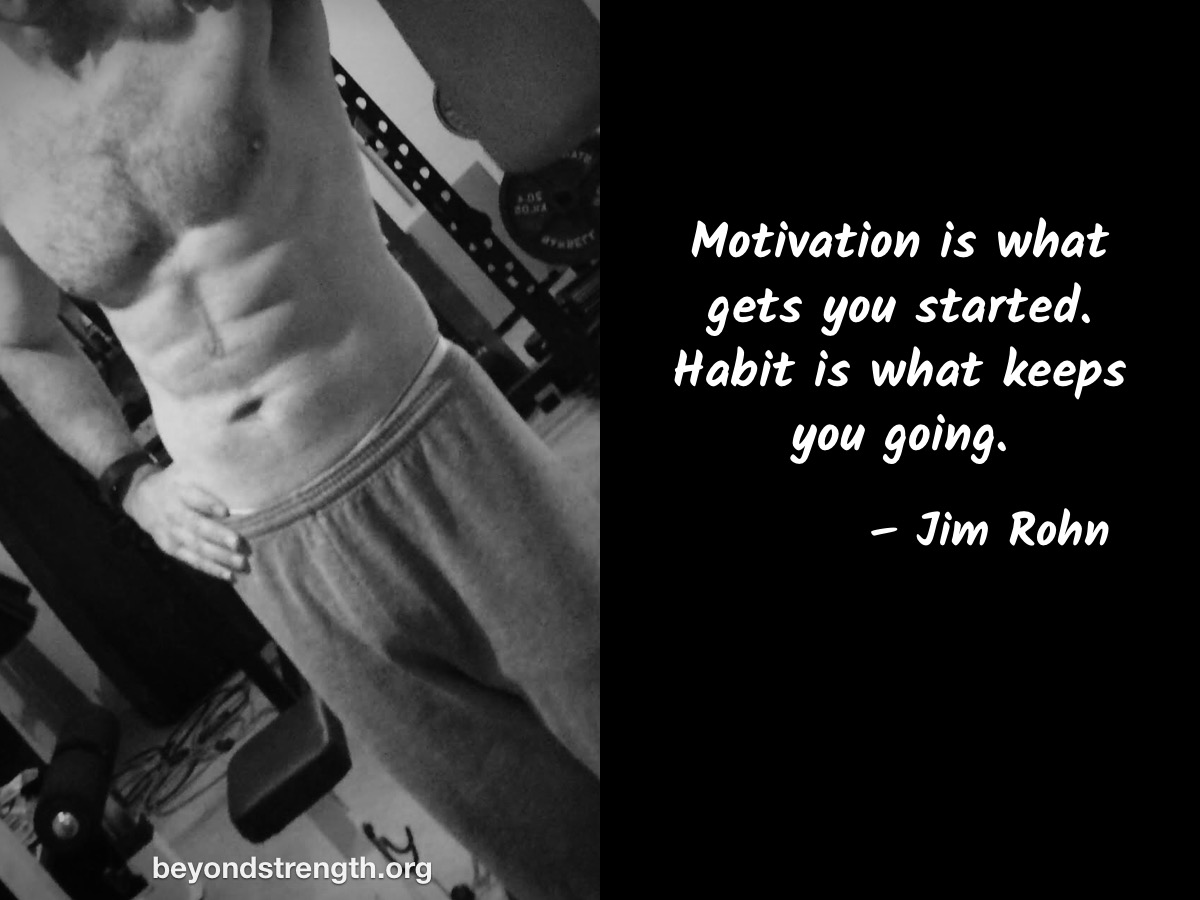
Motivation Monday


Least Bad Option
If you stumbled across this article assuming it’s about the election or the last six months of political idiocy, it’s not. It’s actually about attitude, motivation, and inspiration. But keep reading! I’m certain you’ll find value, enjoyment and maybe even some parallels.
Pirates of the Caribbean character Captain Jack Sparrow is quoted saying “The problem is not the problem. The problem is your attitude about the problem.” It’s just coincidence that I was on the Caribbean coast of Mexico when the substance of this article emerged.
Being in Mexico resulted from a canceled cruise, but I wouldn’t call it a bad option. The weather, accommodations, surroundings, sustenance, and company were near-perfect. Conversely, as I write this it’s a snowy and windy nine degrees…to say I’d rather be back in Quintana Roo is an understatement. Nonetheless, as I try to warm my icy toes and glance out at blowing snow, I think back to a walk on the beach just a week-and-a-half ago.

Like some of you, I people-watch. Most anyone in the profession of arms will tell you people watching is not just a clumsy excuse husbands use when their eyes wander. For those trained to observe and expected to respond when things go bad, being on ‘constant alert’ becomes hard-wired and perpetual. I suspect it’s why many us us struggle to rest, unwind, or relax…especially in public spaces.
As I sought to ‘unwind’ on the beach, I noticed an athletically well-put-together, short-haired, middle-aged man smoothly striding the Mexican sand with stoic confidence. Were it not for wearing shorts, I would never have noticed his prosthetic lower left leg. The way he carried himself and combination of physical attributes convinced me he was a fellow combat veteran who’d paid a higher price than most. A chance meeting in the gym would later confirm my instant assessment was completely incorrect. But my new friend turned out to be no less impressive and inspirational.
I’ve built a notable gym and enjoy working out at home. I’m thankful to be self-motivated enough to consistently do so alone, but I don’t begrudge those who patronize gyms and derive motivation from it. In fact, it’s long been my desire to open one. But I can do without the posturing testosterone-festivals at some public gyms, where genetically ‘gifted’ beefcakes preoccupied with impressing others look down their flaring nostrils at average guys like me. Still, I sometimes find inspiration there. Mostly from humble, hard-working hard-gainers, unconcerned with attention-grabbing mating rituals. Such was the case with Greg.
He was there to work; harder than most. The fact that he is an amputee made no difference, yet made all the difference. I watched Greg’s presence raise the level-of-effort throughout the gym, mine included. By the time I introduced myself, he was cooling down on a recumbent bike, still sweating more than me. I thanked him for the inspiration and asked, “Was it one of the three ‘Cs’ – cancer, combat, childhood injury?”
There was no hint of annoyance with my imposition, nor hesitation with his answer. He smiled and replied “You forgot diabetes and motorcycle crash. Those are the two I get most often.”
It was a motorcycle crash; broadsided by a car that ran a red light.
Greg freely shared his story there in the gym, and poolside as we chatted off and on the next few days. I quickly came to appreciate and respect his disposition, the human being he is, and what he does to counsel others who’ve suffered catastrophic injuries.
In his book Call Sign Chaos, Jim Mattis quotes a writing by President Thomas Jefferson that reads, “What is good in this case cannot be effected. We have, therefore, only to find out what will be least bad.” According to Mattis, Jefferson was speaking of how to deal with England in 1807.
The context is clearly different, and I don’t presume to speak for Greg. But in my conversations with him, I understood that for three years he underwent recommended surgeries in attempts to preserve his damaged limb. He told me having it removed was one of the best decisions of his life. In his case the ‘good’ could not be effected. His lower leg and foot, despite being ‘preserved’, did not function properly. Amputation, while perhaps the ‘least bad’ option to him at the time, ultimately became the best solution. It’s tough to argue that truth when you see Greg walking down the beach, jumping in the pool, or out-sweating others in the gym. By the way, he still loves to waterski.
Truth is, I wasn’t most stirred by how Greg carried himself, his impressive physical shape, or even his tolerance of a stranger interrupting his workout to ask personal questions. It was his humble spirit and positive attitude. I noted many nuggets of wisdom as we talked, but the one that stuck with me most went something like this: ‘I’ve always believed there’s no sense feeling sorry for yourself…you just gotta pick yourself up by the bootstraps and keep going’.
Well said, Greg. And well-lived. I hope to go skiing with you in South Texas sometime.
Keep doing great things!

Get Strong. Be Strong. Stay Strong.
Mattis, J.N. & West, F.J. (2019). Call sign chaos. New York, NY: Random House.
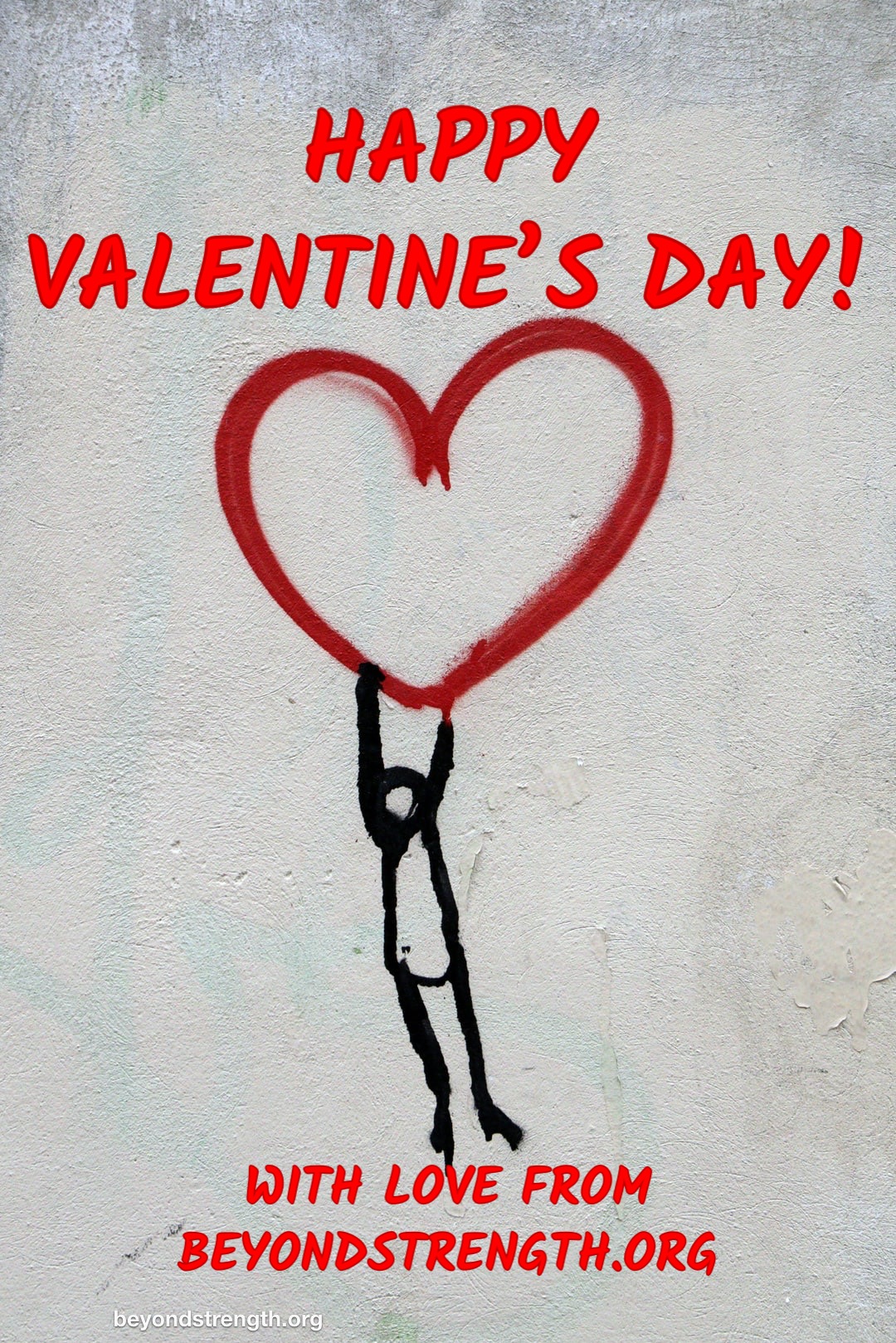
Happy Valentine’s Day

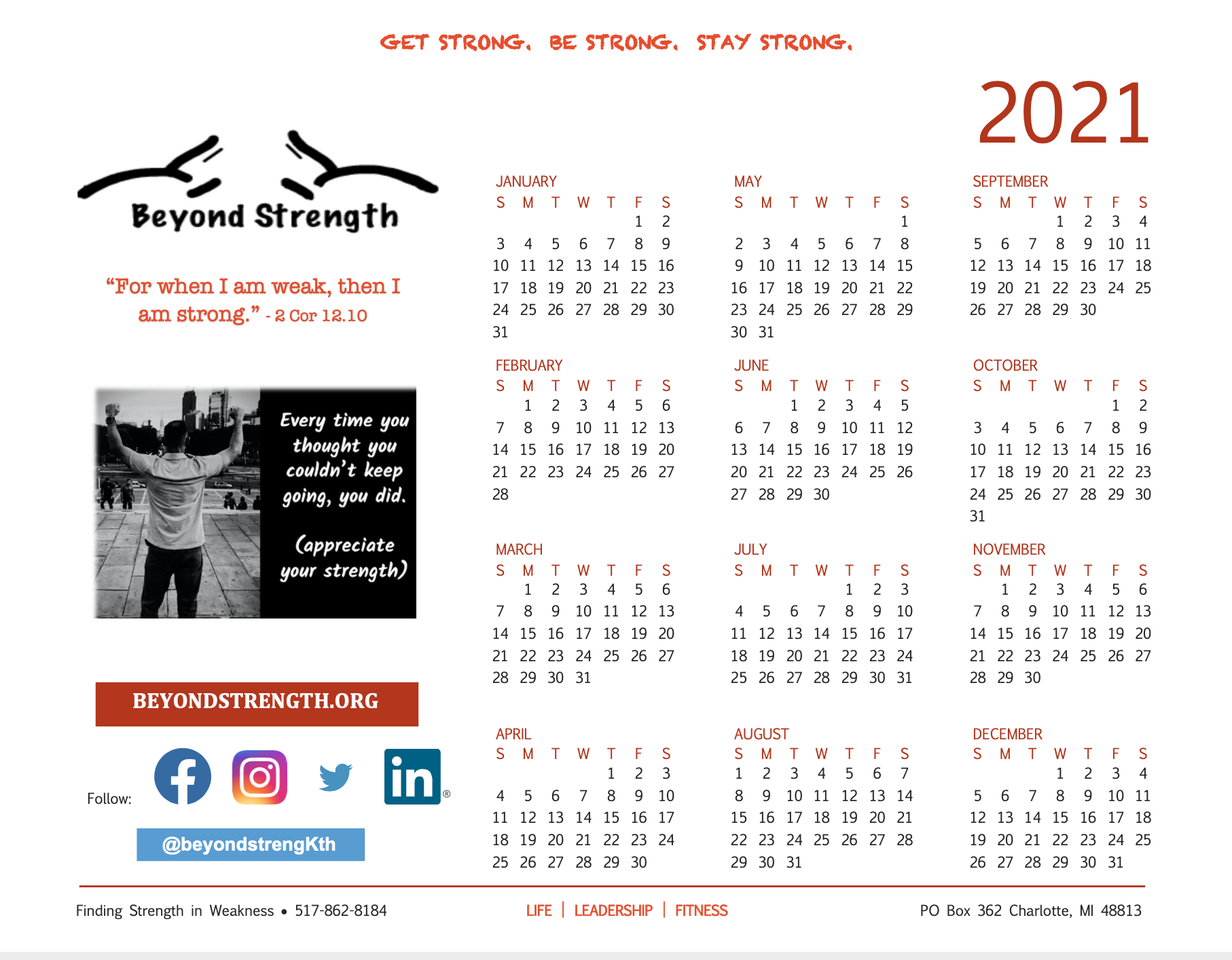
Thanks! (Video Update)

Six Foot Cup
I am at odds with myself. I have become increasingly conflicted. I feel this way; then that way. I’m at peace and content; then I’m stressed and unsettled. This statistic is concerning; but that doesn’t add up. Remote work is getting old; but I don’t want to go back to work. It’s reasonable to respect the seriousness of the pandemic and not be careless or reckless; but until the vaccine is predominant, it’s obvious the virus is going to do what it wants to do, restrictions or not.
What explains those who diligently wear masks, socially distance, and adhere to every recommendation and edict from the experts, yet are still infected? What explains how some states’ restrictions are driving small businesses and restaurants into extinction, while others, with fewer restrictions, have lower death rates, citizens are happy, and businesses thrive? It seems the things we think are most helpful aren’t a silver bullet after all, and things we think are most perilous maybe aren’t as devastating as we thought.
I liken it somewhat to parenting. You can do everything wrong and your kid will still turn out alright; you can do everything right and your kid will still take a left at Albuquerque, delivering indescribable anguish.
Point: Many people have done everything right, yet still catch COVID.
Counter-Point: Many people have been careless, nonchalant, or downright rebellious to recommendations, yet they’re doing fine.
Truth: There is a worldwide crisis.
Sad-Truth: Political posturing has been rife throughout the crisis…on all sides.
I grieve for what our country has become. No longer a shining example of democracy to the world, we have lost a common sense of dignity and respect. Peaceful protests are one thing. But antagonism has led to months of destructive civil unrest, disobedience, death, and millions in damages. The U.S. is supposed to be the world’s democratic leader. Now we look like a dysfunctional junior high school. Our political ‘leaders’ and elected officials have cast aside statesmanship, diplomacy, and decorum in favor of hissy-fits and name-calling. Taking credit or blaming others for something clearly beyond anyone’s complete understanding takes precedence over doing the right thing.
As a man of faith, I’m called to be subject to governing authority, and to be anxious for nothing (Rom 13.1; Philippians 4.6). But I am admittedly frustrated and confused. My heart aches for those who have lost loved ones to this wicked affliction. And for people losing their life savings and livelihoods because they aren’t allowed to responsibly resume reasonable, careful business operations; or go back to work at the jobs necessary to do so.
What does all that have to do with six foot cups of coffee? Everything!!
These are tough times even for the strongest among us. People’s mental, physical, spiritual, and emotional well-being have been challenged greatly since this began. Humans are social creatures; nearly a year of social distancing and isolation has been devastating. We need each other!
Hollywood might be onto something, for at least one pivotal scene always seems to take place in a booth or at the counter of a classic roadside diner. Heroes, villains, fugitives, unlikely lovers figuring things out, or conspirators planning a heist. Best done over a hot cup of Joe!
There’s nothing quite like sitting down with a friend. Self-care, buddy-check, confessional, solving world problems, venting. Whatever the reason, it’s good and necessary. I love my alone time…but I need people too! Bonus when it’s without agenda or drama or judgment or problems that need solved.

Such was the advent of the ‘six foot cup’.
It came about during a virtual team meeting. As I expressed my concern over current events and the well-being of my people, I also shared some of my own struggles with so much social isolation. I end meetings imploring them to call, text, email, or video me any time if they need anything or just want to talk. Pleasantly, a number of them have. On this occasion I offered to meet anywhere in the state for a ‘socially-distanced’ cup of coffee.
Immediately, a trusted colleague and friend – intuitive to my need, and perhaps desiring some adult conversation himself – messaged to take me up on that “six foot cup”. Therapeutic for us both, we’ve since met twice.
I refuse to live my life in fear of this pandemic. But I likewise refuse to allow my actions to cause others concern or to stumble. I continue to respect the well-being (and fears) of others and adhere to the precautions of wearing a mask and not being careless in contact or interactions with others. These are not unreasonable expectations for anyone.
Maybe it is also reasonable not to pretend to know things we don’t; not to regurgitate dubious statistics; not to buy into or create false narratives; or not to concern ourselves with outward appearances…while being filled with questionable or self-serving motives.
“Woe to you, because you load people down with burdens they can hardly carry…” (Luke 11.46)
“Everything they do is done for people to see.” (Matt. 23.4-5)
God is in control. We are not God. Be wary of those who think they are.
It’s a miracle he hasn’t already smote every one of us for our selfishness, disobedience, and unfaithfulness.
Thanks for the six-foot cup, Karl. Next week?

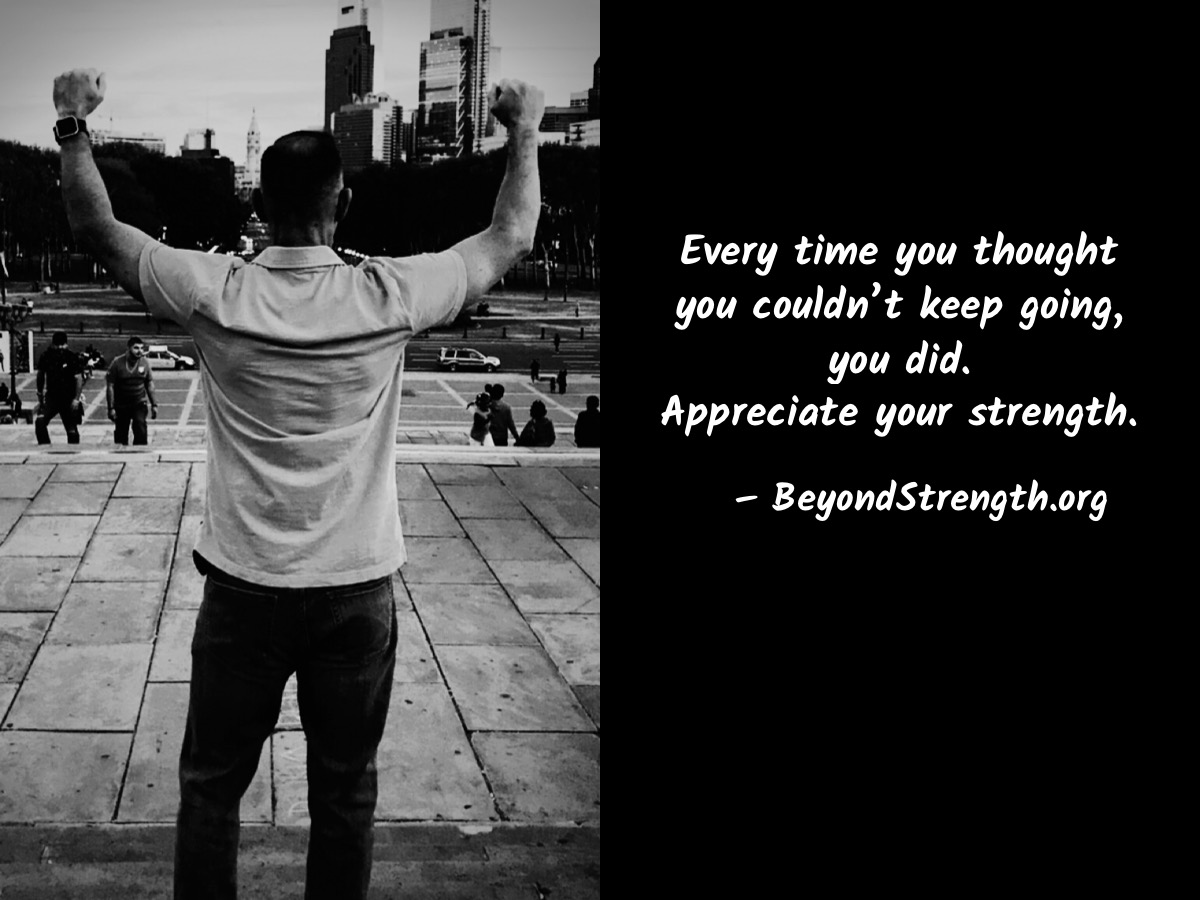
2nd Annual Year in Review
As the calendar turned two years ago I quoted David Jeremiah, who wrote: “A compassionate man does not stand detached from the sufferings of others. Rather, he steps into the world of the hurting and feels the pain and anguish of the one suffering.” The world has been hurting, and many suffered greatly in 2020. Maybe that quote would be better served to start 2021.
The premise behind beyondstrength.org is that strength is more than just being physically strong. It’s also about finding strength in weakness, and helping others get strong, be strong, and stay strong. Thank you, 2020, for proving that premise to be necessarily self-evident.
There’s no sense lamenting the things here we’ve lived ad nauseam the past 10 months via revolving news networks. Instead, I will continuing the fledgling tradition of recapping my blatherings from the past year.
Surely you read, enjoyed, related to, and benefited from all of my writings the last 12 months?! On the outside chance you missed any of these ‘life-altering’ posts, here’s a summary of Beyond Strength articles from the dumpster fire of a year called 2020.
Cause for Delay (video): Starting the year already behind schedule, I bought time by sending a video update from the island of Lesvos, Greece. I was there with a short-term mission team providing humanitarian support to refugees at Moria Camp. It was an amazing experience and added valuable context to my life experience and walk of faith.

The Leadership T.R.A.P.: The article used the acronym to compare and contrast Task versus Relationship focused leaders and Authority versus the Power-focused leader. Tasks tend to be one-dimensional…just get it done. But tasks and overall mission are best accomplished when relationships built of genuine care for your people come first.
Free Samples of Forgiveness: I get bogged down dwelling on my mistakes or how I’ve been wronged by others. Counselors call that ruminating. My struggles in this area are rooted in difficulties accepting and granting forgiveness. I’m committed offering forgiveness more freely and being grateful for forgiveness I’m granted. “For if you forgive other people when they sin against you, your Heavenly Father will also forgive you. But if you do not forgive others their sins, your Father will not forgive your sins.” Matt. 6.14-15
March Forth: What better month than March to march forth toward fulfilling your purpose, achieving your goals, or making the world a better place? I suggested some ideas like starting a blog or other venture; starting a reading program; volunteering; or getting your fitness goals on track. How did you do?

Well That’s Fabulous: Chances are you’ve seen or heard the abbreviation ‘wtf’. If seeing it makes you uneasy, don’t be. It stands for Well That’s Fabulous. WTF was a discussion about the disturbing trends being witnessed within the pandemic. This is an unprecedented crisis; no one person, organization, or government has all the answers. People should stop blaming others; stop trying to advance personal and political agendas; stop arguing about who should have done what, when; and stop trying to be an infectious disease, economics, supply chain, business, or political expert. Instead, start being more caring, compassionate, cooperative, humble, and kind.
Conspiring for Good: Election interference and virtually everything surrounding COVID-19 generated rife theories of conspiracy or malfeasance that continue to thrive. Whether conspiracy theories do more harm than good or serve to help maintain proper balance in the world, it can take years for the truth to be revealed…and even then there will be those who doubt. Conspiracies make for great entertainment, but also cause great divisiveness. Commit to conspiring to do good.

Be the Solution, Not the Problem: Here were a few ideas I shared to be more of a solution than a problem.
- Make room for God in your life. When we understand our own unworthiness compared to a Holy God, we tend to be less of a problem for others.
- Stop claiming the misfortunes of others as your own in some attempt to justify living however you want, or as an excuse for your own bad behavior. “Let your light shine before others…” (Matt. 5.16)
- Embrace diversity. Enable diversity to foster and thrive by treating everyone with dignity and respect.
- Take ownership of your mistakes and shortcomings. Owning your mistakes is solution-oriented; blaming others makes you part of the problem.
- Pick up after yourself; leave things better than you found them; say please, thank you, and I love you more often.
- If you see someone struggling or in need, help them. Saying to yourself, “It’s not my problem” is part of the problem.
Heard, Understood, Acknowledged: An essay about the challenges of interpersonal and organizational communication. Sometimes it’s not what I say, but my delivery that sucks. Like other challenges, there’s probably no easy answer to solving communication problems. But I have found timeliness, openness, transparency, and over-communicating helps. Can you hear me now?

Gains without Pain: There’s something to be learned from pain in our lives, be it physical, emotional, psychological, or otherwise.
- Recognize its warning
- Protect the injured area(s)
- Strengthen surrounding structures that are weak
- Properly address and treat the root cause
- Don’t bury, numb, or mask it with medication, over-indulgence, or risky behavior
- Avoid it when it’s causing damage or grief
As we move on from 2020 into the new year, I pray you’ll have a Happy(er) New Year, you’ll continue to follow along, and that you’ll make a positive difference in others’ lives.
“A life is not important except in the impact it has on other lives.” – Jackie Robinson
Keep doing great things!
Get Strong. Be Strong, Stay Strong.

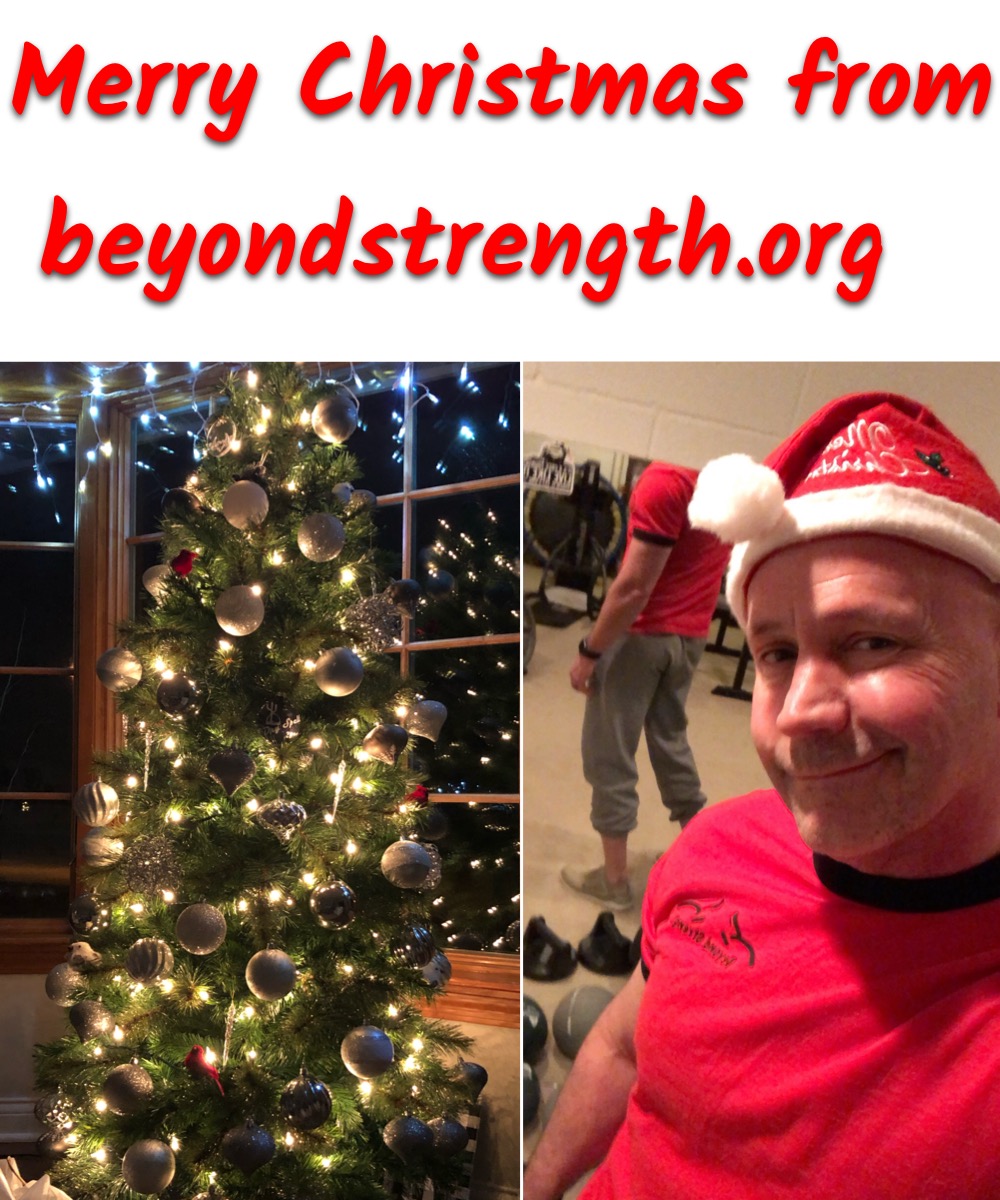
Merry Christmas!

